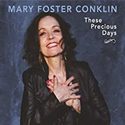|
With just a few days remaining in the winter, let's march into the sunnier times along with a parade of singers worthy of a listen in any season. Awaiting summer weather is the subject of the first track on Mary Foster Conklin's set, while the jazz number "Up Jumped Spring" is a choice on the releases from two other songbirds: Maria Jacobs and Marina Pacowski.
 MARY FOSTER CONKLIN MARY FOSTER CONKLIN
THESE PRECIOUS DAYS
Mock Turtle Music
CD, Digital
With the sort of song selections, phrasing, and arrangements that present her as more multi-dimensional and emotionally unguarded than in the past, singer Mary Foster Conklin's first release in several years is involving in its introspective bent. The 11-track These Precious Days takes its title from the lyric of the included "September Song" (Kurt Weill/ Maxwell Anderson, introduced in the 1938 musical Knickerbocker Holiday), which offers reality, rue and ruminations concerning time passing and urges making the most of time remaining. It's a theme that comes up poignantly and pointedly throughout the thoughtful set. Examples are "Heart's Desire," advocating a "seize the day" approach in following one's "special dream" and two numbers with the sober, grown-up view of valuing a romantic relationship that might not be a candidate for idealistic happily-ever-after shelf life ("Just for Now" and "Until It's Time for You to Go").
If you listen in track order, you'll be eased into the seriousness with Leonard Cohen and Sharon Robinson's piece about eagerly awaiting "Summertime" starting things off. Then, as the material becomes more pensive, lyrics are put under the microscope for the vocalist's careful line-by-line examination. Although some of her past recordings styled songs in a way that may have felt weighted more toward getting into grooves with melodies and tempi, and recalled the ultra-hip "cool school" of jazz singing, there's nothing offhand here. In the six-person band, Sara Caswell's prominent violin work adds a dignified gravitas that deepens (and never cheapens) the sentiments. Arranger/pianist John Di Martino keeps things quite accessible without being predictable.
Lower-range vocal notes are especially effective and the partially spoken piece about revealing one's "Scars" (Fran Landesman/ Simon Wallace) is effectively dramatic. Two contrasting selections by the writing team of Jerry Leiber and Mike Stoller are included: the dreamy "A Little White Ship" and the sly "Some Cats Know," the latter (included in the stage revue of their work, Smokey Joe's Cafe) serving as a revisit to a number on Mary Foster Conklin's first album, Crazy Eyes, from 1998.
These Precious Days is a compelling company.
 MARIA JACOBS MARIA JACOBS
BACK AT THE BOP STOP
I Warble Music
CD, Digital
She soars. She swings. She scat-sings. Captured in live performance, Maria Jacobs showcases her jazz skills, zooms to the upper range of her supple voice with gymnastic flair, elongates and decorates the vocal lines, getting sultry and steamy as she manipulates the music. She seems to luxuriate in it. Back at The Bop Stop, recorded live (with a couple of bonus tracks done in a studio to total a playing time of a full hour), impresses, even if the chanteuse's bag of tricks and treats might arguably upstage the designs of some material's optimum emotional potential as originally intended. But, when it comes to songs one has heard aplenty, there's plenty of focus that can bear the share as we enjoy the "wow" factor of technique. Pianist Rock Wehrmann sizzles and dazzles, too, with the support of bassist Brian Thomas and drummer Jamey Haddad.
While the intimacy and electricity are felt, the applause is apparently trimmed to save time, and any spoken comments that might have been part of the show (beyond "thank you") are edited out. The set list includes a few re-visits to material from the several prior Jacobs collections (as recent as last year's live set recorded at the same Cleveland venue), such as her oft-offered original "Pour Me a Cup of Yesterday," a recipe combining the mellow and the melancholy, infused with a shot of adrenalin toward the end. Of the ten live tracks, half reach or pass the six-minute mark, with longish breaks featuring instrumental and/or scat segments, so these selections might cause some listeners' attention to meander more than would be the case experiencing this in person.
Two Cole Porter standards, "You'd Be So Nice to Come Home To" and "Easy to Love," are among the choices, grist for the mill in these gutsy workouts. But Maria Jacobs' most impressive work is in the way she passes the challenging jazz singer's litmus test by sailing through "Moody's Mood for Love," the melodic extension of the standard "I'm in the Mood for Love," fitted with additional lyrics. From Frank Loesser's Broadway score for Greenwillow comes "Never Will I Marry," the in-homage treatment here reflecting a memorable arrangement by sax man Cannonball Adderley who recorded it with singer Nancy Wilson.
Back at The Bop Stop, which begins with the buoyant "Up Jumped Spring" and keeps things mostly jumping till the studio bonus track of Maria Jacobs' vibrant self-penned "Pale Moon, Blue Sky," may jump high up on a list of new favorites if you're looking for energy and musical moxy.
 MARINA PACOWSKI MARINA PACOWSKI
INNER URGE
Summit Records
CD, Digital
Marina Pacowski can handle the leaps of "Up Jumped Spring" or use her voice like an instrument with super-speedy wordless vocalizing on compositions by major jazz figures, adding her own melody improvisations or lyrics in English or her native French. Several American standards sung in English get a marshmallowy soft coating in her distinctively sweet timbre with her French accent adding to the charm. She peppers some of those with more breezy, skillful scat-singing as the varying groupings of excellent instrumentalists share the spotlight. With most of the 13-song collection having her own arrangements, Inner Urge is named for the Joe Henderson composition. Also a much-experienced pianist, she only takes to the keyboard herself for this number, on which she is joined by virtuoso sax player Joel Frahm. (This is the only cut he appears on, although he alone is given prominent billing on the cover as "special guest.")
Jazz devotees will note Miss Pacowski's prowess and comfort zone in her arrangements and the long-lined nimble navigation through the challenging repertoire. Another nice touch is the guest participation of Brent Fischer on vibes for "Pensativa," written by his late father, Clare Fischer. Those more in search of refreshing takes on familiar Great American Songbook standards may find her youthful sound and guileless approach as sparkling as dew on favorite perennials. While these smooth coatings of the tunes may not be full of nuances in phrasing, there are graceful glides through the evergreens "Taking a Chance on Love" (bouncy), "I'm Old Fashioned" (serene), "My Foolish Heart" (with a hint of its cautionary advice), and there's hope coming in all directions with "East of the Sun (and West of the Moon)."
Producer Scott Whitfield, who arranged "East of the Sun" and plays trombone on it and "I'm Old Fashioned," also wrote the CD booklet's highly flattering and specific liner notes (eight and a half pages) that tell us about the singer's background and motivations, and aspects of the arrangements. Also in the booklet are the words Marina Pacowski wrote for the included Miles Davis creation called "Solar"–as she sings them in French as well as an English translation.
There's more French representation with the immortal "La vie en rose" getting a tender embrace and "What Are You Doing the Rest of Your Life?" (music by Michel Legrand, here wrapped in a French lyric by Eddy Marnay, inspired by the original English words by Marilyn and Alan Bergman). The latter ballad is warmly sung with sensitive piano accompaniment by Josh Nelson, who is present on four other cuts.
If you'd like to consider a trip to a world where pillowy, unpretentious prettiness co-exists with knock-your-socks-off musical prowess, I would urge you in the direction of Inner Urge.
|
|